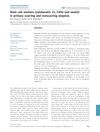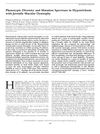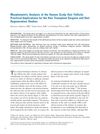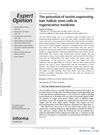 55 citations,
March 2012 in “Journal of Investigative Dermatology”
55 citations,
March 2012 in “Journal of Investigative Dermatology” Research on epidermal stem cells has advanced significantly, showing promise for improved clinical therapies.
 54 citations,
October 2019 in “Cochrane library”
54 citations,
October 2019 in “Cochrane library” Some drugs may reduce prostatitis symptoms short-term with few side effects.
 54 citations,
April 2019 in “Journal of cellular physiology”
54 citations,
April 2019 in “Journal of cellular physiology” miR-218-5p helps skin and hair growth by targeting SFRP2 and activating a specific signaling pathway.
 54 citations,
November 2017 in “Scientific Reports”
54 citations,
November 2017 in “Scientific Reports” The study found that certain microRNAs are higher in the cells and lower in the fluid of women with a specific type of polycystic ovary syndrome, and one microRNA could potentially help diagnose the condition.
 54 citations,
May 2017 in “Biomedicine & Pharmacotherapy”
54 citations,
May 2017 in “Biomedicine & Pharmacotherapy” Edible seeds from the Cucurbitaceae family like pumpkin and watermelon seeds are nutritious and may have health benefits, but eating too much can cause side effects.
 54 citations,
November 2015 in “Methods in enzymology on CD-ROM/Methods in enzymology”
54 citations,
November 2015 in “Methods in enzymology on CD-ROM/Methods in enzymology” Keratins are important for skin cell health and their problems can cause diseases.
 54 citations,
September 2012 in “Dermatologic Clinics”
54 citations,
September 2012 in “Dermatologic Clinics” Some medications can cause hair loss, but stopping the drug usually leads to recovery within 3 months.
 54 citations,
January 2009 in “British Journal of Dermatology”
54 citations,
January 2009 in “British Journal of Dermatology” Scarring alopecia affects different hair follicle stem cells than nonscarring alopecia, and the infundibular region could be a new treatment target.
 54 citations,
June 2003 in “The journal of investigative dermatology. Symposium proceedings/The Journal of investigative dermatology symposium proceedings”
54 citations,
June 2003 in “The journal of investigative dermatology. Symposium proceedings/The Journal of investigative dermatology symposium proceedings” Disruptions in hair follicle fibroblast dynamics can cause hair growth problems.
 53 citations,
September 2020 in “Stem Cell Research & Therapy”
53 citations,
September 2020 in “Stem Cell Research & Therapy” New methods to improve the healing abilities of mesenchymal stem cells for disease treatment are promising but need more research.
 53 citations,
April 2018 in “Journal of The American Academy of Dermatology”
53 citations,
April 2018 in “Journal of The American Academy of Dermatology” Cancer treatments often cause hair disorders, significantly affecting patients' quality of life, and better management methods are needed.
 53 citations,
October 2014 in “Free radical biology & medicine”
53 citations,
October 2014 in “Free radical biology & medicine” Defective mitochondrial DNA replication causes aging symptoms and increased oxidative damage in mice.
 53 citations,
March 2014 in “Growth Hormone & IGF Research”
53 citations,
March 2014 in “Growth Hormone & IGF Research” IGF-1 injections help mice grow more hair by increasing cell growth and blocking a hair growth inhibitor.
 53 citations,
July 2011 in “Biomaterials”
53 citations,
July 2011 in “Biomaterials” Human liver cells stick to hair protein materials mainly through the liver's asialoglycoprotein receptor.
 53 citations,
November 2006 in “Journal of Endocrinology”
53 citations,
November 2006 in “Journal of Endocrinology” Prolactin slows down hair growth in mice.
 53 citations,
September 1999 in “The journal of cell biology/The Journal of cell biology”
53 citations,
September 1999 in “The journal of cell biology/The Journal of cell biology” K16 can partially replace K14 but causes hair loss and skin issues.
 52 citations,
September 2018 in “International Journal of Molecular Sciences”
52 citations,
September 2018 in “International Journal of Molecular Sciences” Ginseng and its compounds may help hair growth and prevent hair loss, but more human trials are needed to confirm this.
 52 citations,
October 2016 in “Clinics in Dermatology”
52 citations,
October 2016 in “Clinics in Dermatology” Some medications can cause acne, and stopping these drugs is the main treatment.
 52 citations,
April 2013 in “Developmental Cell”
52 citations,
April 2013 in “Developmental Cell” Brg1 is crucial for hair growth and skin repair by maintaining stem cells and promoting regeneration.
 52 citations,
March 2010 in “British Journal of Dermatology”
52 citations,
March 2010 in “British Journal of Dermatology” Alopecia areata shows a unique type 1 interferon signature, suggesting potential treatment by targeting this pathway.
 52 citations,
November 2003 in “Journal of Investigative Dermatology”
52 citations,
November 2003 in “Journal of Investigative Dermatology” Different harmful mutations in the CDH3 gene cause HJMD, but symptoms vary among individuals.
 51 citations,
September 2020 in “Cell Metabolism”
51 citations,
September 2020 in “Cell Metabolism” Glutamine metabolism affects hair stem cell maintenance and their ability to change back to stem cells.
 51 citations,
May 2019 in “Biomaterials”
51 citations,
May 2019 in “Biomaterials” Researchers developed a method to grow hair follicles using special beads that could help with hair loss treatment.
 51 citations,
November 2010 in “Dermatologic Surgery”
51 citations,
November 2010 in “Dermatologic Surgery” The research provides specific measurements for hair follicles that can improve hair transplant and regeneration techniques.
 51 citations,
January 2003 in “Hormone Research in Paediatrics”
51 citations,
January 2003 in “Hormone Research in Paediatrics” Hormones and their receptors, especially androgens, play a key role in hair growth and disorders like baldness.
 51 citations,
October 2002 in “British Journal of Dermatology”
51 citations,
October 2002 in “British Journal of Dermatology” Finasteride increases hair density in female androgenetic alopecia, but individual results may vary.
 51 citations,
January 1989 in “Journal of Investigative Dermatology”
51 citations,
January 1989 in “Journal of Investigative Dermatology” Men with male-pattern baldness have more androgen receptors in their scalp's oil glands, which may contribute to hair loss.
 50 citations,
November 2010 in “Otolaryngologic Clinics of North America”
50 citations,
November 2010 in “Otolaryngologic Clinics of North America” Recognizing oral symptoms can help diagnose and treat blood and nutritional diseases early.
 50 citations,
February 2007 in “Expert Opinion on Biological Therapy”
50 citations,
February 2007 in “Expert Opinion on Biological Therapy” Hair follicle stem cells could help repair nerves and avoid ethical issues linked to embryonic stem cells.
 50 citations,
October 1986 in “European journal of pediatrics”
50 citations,
October 1986 in “European journal of pediatrics” A boy with severe Vitamin D-resistant rickets did not respond to treatment and lacked a common symptom, suggesting a need for alternative treatments.






























